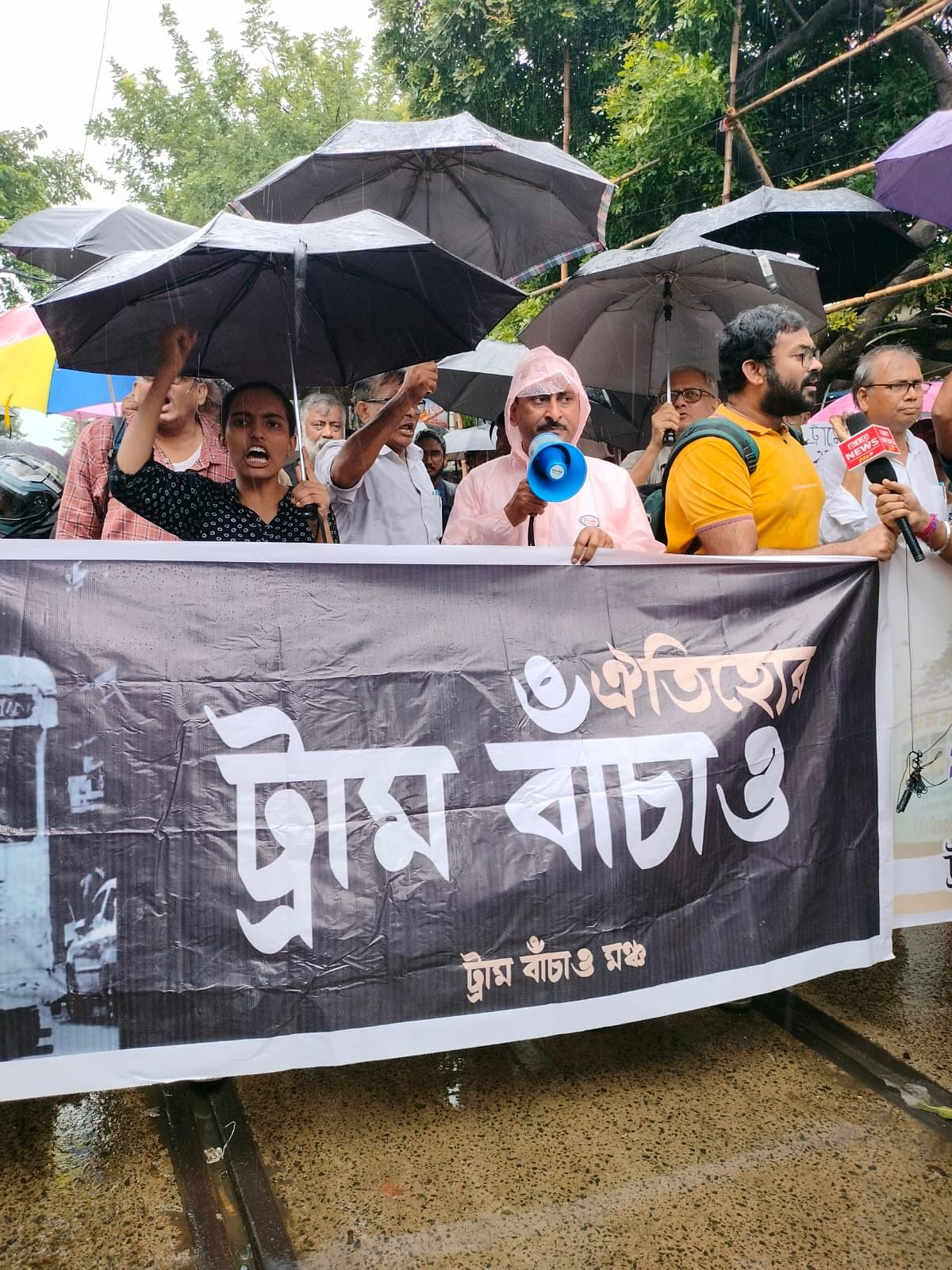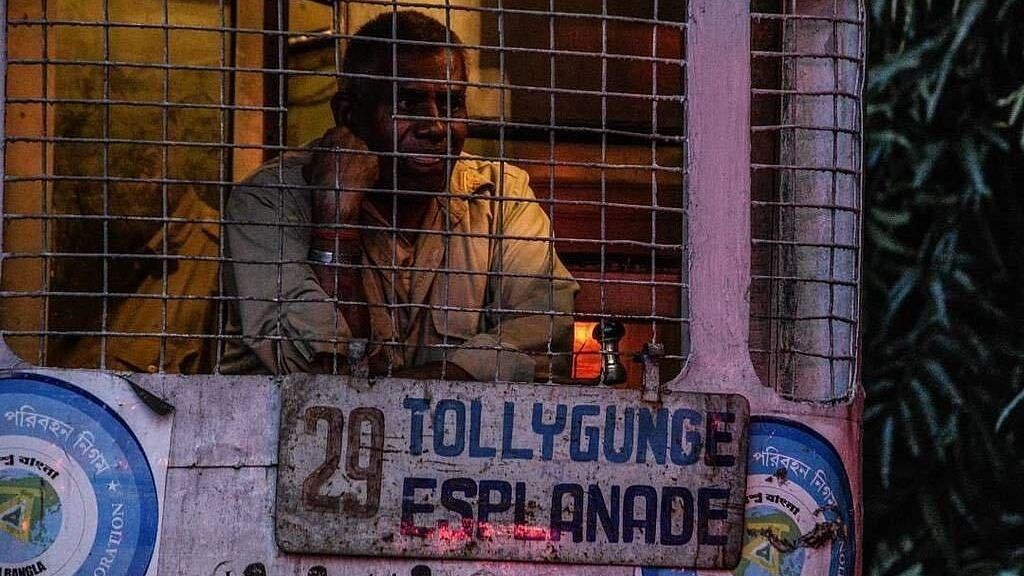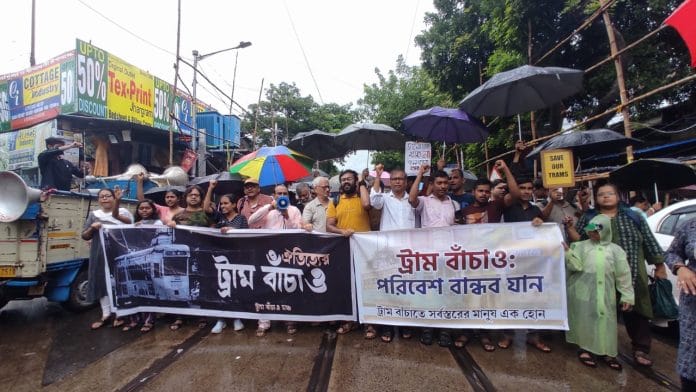Dear Transport Minister of West Bengal,
When you take trams off the streets of Kolkata, you will commit theft. Actually, multiple thefts: of memories and promises. And, dare I say, of prime land from tram depots that land sharks have been eyeing for ages.
Saving the last for later.
First, my most immediate outrage.
By removing trams from Kolkata’s streets, you will steal from me memories of my earliest college romance, very Victorian novel style. Every day, as I waited for a tram to get home to Gariahat from my college at Park Circus, a handsome, bearded young man would show up at the tram stop and shyly make eyes at me. I would look away if and when our eyes met and jump into the tram as soon as it came along.
That was our courtship routine.
One day, when I boarded the tram, he got on, too. But he boarded the second-class carriage while I had boarded the first. Now, if you sat in the ladies’ section of the first- class carriage, you could catch glimpses of the second-class passengers through the wide-open windows. But I was too shy to look. And he was too shy to board first class. Or maybe he was plain broke. Those days, if I remember correctly, a first-class ticket was 25 paise, and second class 15. He was probably a medical student from a college next to mine. But I never got to know. We never spoke.
Yes, it was one of those romances. A streetcar named desire. A tram playing cupid.
Ah, nostalgia!
For many Kolkatans my age—early sixties—that’s probably what makes trams tick. Love the city, love the trams that so define the city, love the memories of sitting in class and hearing trams rumble by, the bells tinkling, the friendly conductor, the wooden ladies’ seats, the lurching about if you didn’t get one.
Pure, unadulterated nostalgia. For the past.
Also read: Last trams standing—Kolkata citizens are pushing hard to keep them running

But let’s look at the future.
My angst about the threatened end of the tram era is also about the future. If trams go, so does the promise that they hold: of clean air to breathe.
Today, in some of the 400 countries where trams are big or being revived—someone in Australia reportedly called the removal of trams during the automobile era of the ’40s, ’50s, and ’60s the most expensive public transport mistake ever made—some of those countries are dabbling in using solar power to run the tram cars. Result: a carbon footprint as near to zero as can be.
Why will this hope for clean air for my grandkids to breathe also be snatched from me?
Dear Minister Sir, your grandkids will be breathing the same air as mine. Don’t uproot their chance at breathable air, please, in the future.
Now to the present. And the notional theft of land.
A 2022 PIL by advocate Sulagna Mukherjee sought that the tram network be preserved, maintained, and utilised for public benefit. It pointed out that large parcels of land had already been sold by the government-owned Calcutta Tramways Company from three lucratively located tram depots. (There are reportedly 16 such sprawling tram depots dotting prime locations in Kolkata.) The buyers, reportedly builders mostly, who would possibly build high-end apartment buildings and glossy shopping malls, may include a “public service” museum thrown in as a fig leaf.
The court has said to preserve, maintain, and restore the trams and services and not touch the assets.
But is anyone in the West Bengal government even listening?

Because, in May 2023, the People United for Better Living in Calcutta (PUBLIC) NGO went to court demanding the West Bengal government immediately stop the bitumenisation of tram tracks. Bitumenisation, effectively, means burying the tram tracks in tar, so that the road surface becomes smooth, but the tracks become completely unusable in the future.
The court gave a stay order at once. No more burying tram tracks in tar and killing off tram services slowly but surely. But, this August, less than three months after the stay, reports surfaced in the media of fresh bitumenisation. Stunned, PUBLIC first gave notice of contempt against the state government for violating the high court stay and, on September 19, when the state made no move to de-bitumenise the track, filed for contempt of court.
The stretch of tram tracks bitumenised so controversially in complete violation of the Calcutta High Court ran from Hazra More to the Kalighat Bridge, a stretch of perhaps 500-700 metres.
And we all know who lives just off that particular road, don’t we.
Chief minister Mamata Banerjee.
Tram lovers in Kolkata came together in 2016 under the umbrella of CTUA, short for Calcutta Tram Users Association. It’s a tiny organisation but they have campaigned big for the trundling electric iron horses on rails and celebrated all the iconic baggage they came with: last year, 150 years of service in Calcutta, once the capital of the British Empire.
But ever since the transport minister declared earlier this week the end of the road for trams was nigh, members of the CTUA have been up in arms. On Thursday, they met outside the Shyambazar Tram Depot in north Kolkata to voice their protest. Heavy rains failed to rain out their parade but did not. Soggy sleeves rolled up, the tram lovers stood their ground, ready to take the fight to the finish.
Wiser, cooler, and more tactical heads are also at work, pooling together urban planners, traffic managers, and environment experts to draw up politics-proof arguments on the need to not just retain tram services in Kolkata but to modernise and expand the network in this city and take trams to other urban centres in the country as well.
Nostalgia, romance, and a love of heritage alone cannot make the beloved trams of Kolkata sustainable. Simple science can. And that lesson in simple science needs to be driven into the heads of those we have elected to run our cities, our lives, and our trams.
Dear Transport Minister, are you with us still?
Sincerely, etc.
Monideepa Banerjie is a senior journalist based in Kolkata. She tweets @Monideepa62. Views are personal.
(Edited by Prashant)







I really feel sorry to know that the Tram services in Kolkata is going to be stopped. I have my own nostalgia, as I was using the services extensively as student of The University of Calcutta, and as the Student of The Institute of Chartered Accountants in 60s. Tickets were affordable for very poor students like us. I wish sincerely that the State Govt introduce technical advancements to improve the services and retain it . It really is a common men’s transport, and a identifying symbol of Kolkata city life.
Excellent article Ms. Monideepa!
Unlike the RG Kar case where you called junior doctors stupid, here, your rage comes through.
This govt has no respect for anyone. They need to be ousted.
I am urging you as a Kolkata based correspondent to run a powerful series on the misdeeds of this govt. This has to be stop. Mamata and her coterie has to go. People of the state have the right to live a peaceful life. The longer mamata stays, the worse she will become.